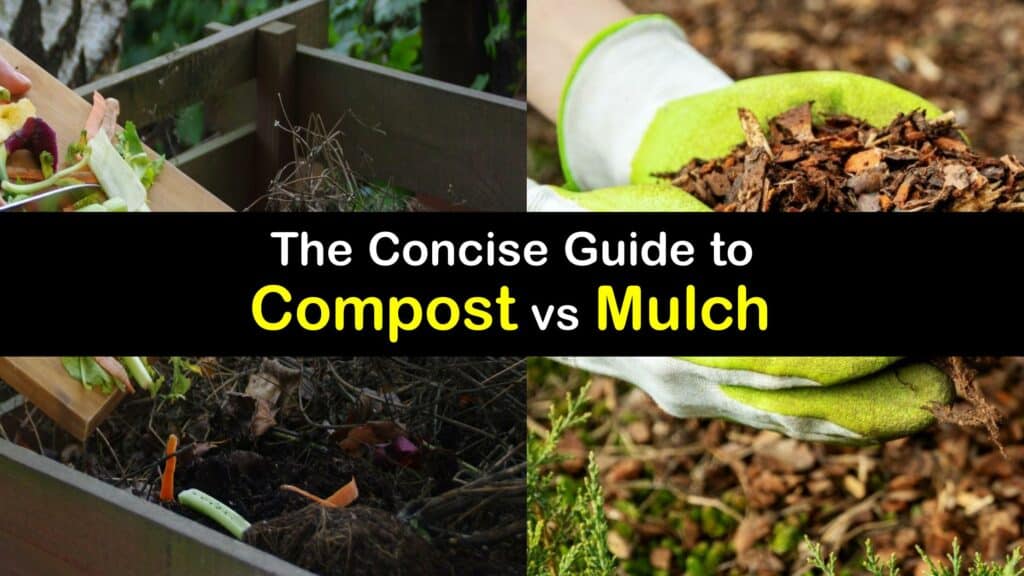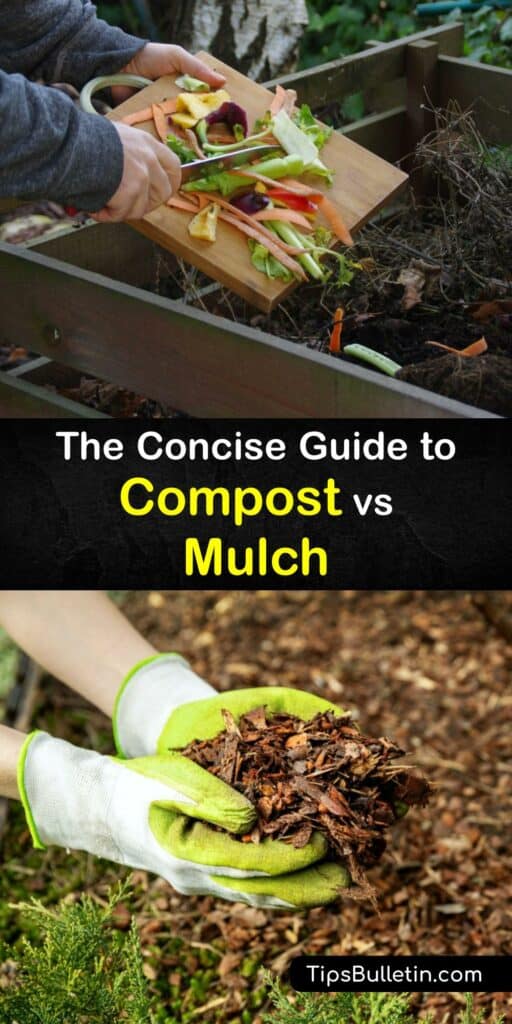Are you confused by the differences between compost vs mulch? Many new gardeners and those with experience aren’t certain whether to use compost or mulch for flower beds. While compost and mulch aren’t the same, compost works as a mulch, and both have value for your plants.
So, what is mulch vs compost vs fertilizer? Mulch is a ground covering used to help the soil retain water and lower erosion. Compost is a type of fertilizer or plant food. This black granular material enriches barren or sandy soil; it improves the earth’s structure so a broader range of flowers and vegetables can thrive.
Compost and various types of mulch are available at your local garden center or nursery; however, it’s simple to source organic mulch and maintain the compost ratio for brown and green materials at home. Explore the properties of compost and mulch and learn how to use them to meet your gardening goals.

Should You Use Compost or Mulch for Flower Beds?
You’re not alone if you struggle to know when to apply compost vs mulch to your containers or beds. In the garden compost and manure have different benefits for the soil. Healthy soil is critical to the success of any flower or food crop, and soil amendments help.
Whether you want to halt soil erosion, feed your flowers, or water less frequently, there’s a soil amendment for the job. Learning about mulch vs compost vs fertilizer allows you to select the best one based on the needs of your plants.

What Is Compost?
Composting is breaking down organic matter to craft a rich fertilizer known as finished compost. Kitchen scraps, yard waste, and organic waste such as paper are ideal for including in your composter. Though we think of these products as waste, they’re nutrient dense.
They contain many critical nutrients for plant growth, such as nitrogen, carbon, potassium, and calcium. A compost pile, tumbler, or bin creates the ideal environment for decomposition. Add organic material, and keep the heap moist and aerated to encourage breakdown.
Over time, the nutrients in the waste are released, and it becomes finished compost to use as fertilizer or mulch. Finished compost has the bonus of improving soil structure by creating more air pockets, helping supply nutrients, and retaining water.
How to Make Compost
Finished compost is an excellent organic fertilizer; anyone can build a compost pile or start composting indoors. Organic material is combined in a 3:1 ratio of carbon-dense to nitrogen-dense substances to facilitate degeneration.
Kitchen waste, such as vegetable peels and green plant material, is nitrogen-rich, also known as green matter. Dry leaves, branches, and paper are carbon-heavy and known as brown material. Another great brown material to use is cotton burr compost for lawns. This dry compost material makes an excellent compost booster.
Mix green and brown materials in the recommended ratio in a pile or bin, turn often and keep damp. The organic matter degrades over time, releasing nutrients, as it becomes a black textured substance known as finished compost.
The best composting method depends on the space available, the volume of organic waste produced, and how much fertilizer you plan to generate. A countertop tumbler or indoor composter is perfect if you have a small amount of waste. Consider a compost heap or an outdoor bin to compost large volumes of organic matter.
Exploring the Properties of Compost vs Mulch
Compost promotes soil fertility and enhances your garden soil structure. Spread it on the soil surface as compost mulch or mix it into your native soil as a soil amendment. The difference between mulch and compost is that compost is a soil conditioner. It provides nutrients that support plant growth and a physical barrier if used as mulch.
Mulch is a covering that sits on top of the garden bed to help maintain soil temperature, prevent soil erosion, and reduce water loss and weed growth. Soil moisture and heat evaporate quicker from bare soil, and erosion leaves plant roots vulnerable. Mulching mitigates this.
Organic mulch options like bark or compost mulch are naturally occurring and break down over time, especially when exposed to the elements in the garden. Inorganic mulch, like rubber chips, is usually made of synthetic material and doesn’t degrade.
Create Your Own DIY Mulch
Though it’s convenient to head to the garden center and grab a bag of mulch, there are multiple ways to craft your own quickly and easily by recycling garden waste. A layer of grass clippings laid over the topsoil is ideal. Other ideas include dry leaves, pine needles, bark chips from tree work, and even newspapers.
In general, mulch should be two to four inches deep. If the mulch is too thin, weeds tend to break through. If it’s too thick, it might prevent water from reaching the roots.
The Differences Between Mulch vs Compost vs Fertilizer
Though it seems daunting, understanding the differences between soil amendments is straightforward. Fertilizer or manure is a plant food. Its goal is to provide nutrients to support fruit, flowers, or foliage growth and development.
Most fertilizers contain nitrogen, potassium, and phosphorus in various ratios depending on the group of plants they feed. Compost is a type of fertilizer since it nourishes plants.
Mulch is a structural amendment used on the soil to improve its properties. Growers lay mulches above the topsoil, acting as insulation and a barrier. This barrier stops weed seed particles from reaching the soil and growing, keeps water in, and prevents soil erosion.
Compost is also a type of mulch as it is efficient for the above purposes. However, it also fertilizes when rain or watering takes the nutrients it contains into the soil.
Mulch and compost promote growth and vigor in everything from ornamentals to food crops. Find out how to use compost or mulch for flower beds and grow a prolific vegetable garden, or enjoy plants with vibrant leaf color and excellent health. Purchase compost or mulch by the cubic yard at a gardening store, or make your own.

If you loved this concise article on compost vs mulch, please share this knowledge with your friends who are curious about the benefits of mulch vs compost vs fertilizer on Pinterest and Facebook.